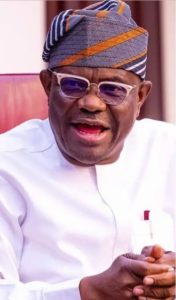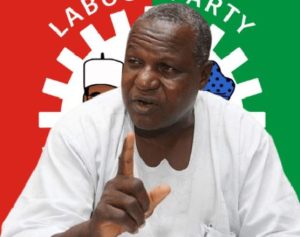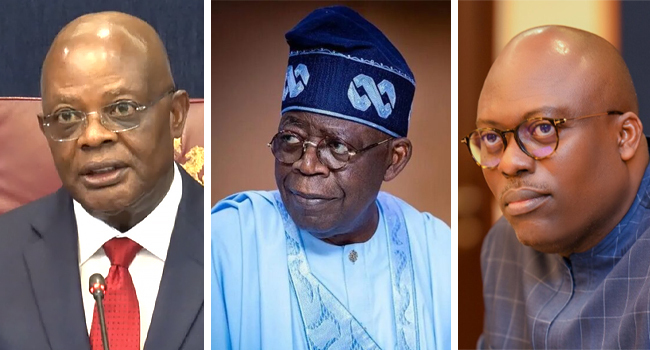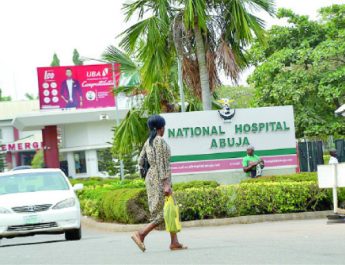President Bola Ahmed Tinubu may have recalled the suspended Governor Siminalayi Fubara, his deputy, Professor Ngozi Odu and members of the Rivers State House of Assembly whom he bent the Constitution to depose, but there are strong indications that the reinstated Governor may have been stripped of all powers to deliver quality governance to the people of Rivers State since the state’s political structures and resources are now safely in the hands of the Minister of the Federal Capital Territory, Nyesom Wike and the President who earnestly await the governor’s defection to the ruling All Progressives Congress (APC) in the coming days
By Edu Abade
The die is cast on Rivers State politics. The castrated governor Siminalayi Fubara has returned to the government house having all his wings clipped. The once vibrant, eloquent, bold and fearless Fubara is now timid, lame duck, a puppet and a political orphan. The ebullient governor who looked Nyesom Wike in the eyes and mocked, as with former president Olusegun Obasanjo, “I dey kampe”, has become like a jellyfish pulled out of the waters and dropped on a dry ground. Today, Fubara has become an errand boy to his once sworn enemy, Wike courtesy of President Bola Tinubu’s defiant use of excessive force on government institutions and the citizenry, trampling on the Constitution of the land.
President Tinubu has lifted the suspension of democratic institutions and actors in Rivers State. But clearly, the saying ‘no victor, no vanquished’ does not apply in the Rivers case. Rather, it is a case of the victor versus the vanquished. And Governor Fubara may have returned from his six-month suspension-but only as the vanquished-the victor being Minister of the Federal Capital Territory (FCT), Abuja, Wike and of course, President Tinubu!
Fubara’s reinstatement followed the purported successful conduct of local government elections on Saturday, August 30, 2025 in which all of Wike’s loyalists emerged chairmen and councilors across the 23 councils of the state, effectively placing the grassroots politics and by extension, the state’s political structures squarely in the hands of Wike and his protégés.
From all permutations, political pundits have concluded that given the undercurrents that followed the Sole Administrator, Vice Admiral Ibok Ette Ibas (rtd) six-month emergency rule from March 18, 2025 to September 17, 2025, Fubara may just have returned as a lame duck governor, more so pledging his unalloyed loyalty to President Tinubu and Wike upon resumption, having been stripped of all powers to govern the oil-rich state.

Reason: Wike and President Tinubu have vested interest in both the political structures and the vast oil and gas resources of Rivers State-and that is understandable-Wike needs to hold onto the political structures of Rivers State to oil his political wheels, while the President must maintain a stronghold on the state ahead of the 2027 general elections.
And so, while Governor Fubara, his deputy, Professor Odu and members of the State House of Assembly, led by the Speaker, Martins Amaewhule, have returned to their various positions following the suspension of the emergency rule, Wike still has the proverbial yam and the knife in terms of controlling the state affairs by and large.
Ibas who spoke at a thanksgiving service on Sunday, September 14, 2025 urged the Rivers people to nurture the existing peace built by his administration in the past six months.
Speaking at a public lecture, titled “Good Governance and Democratic Dividends,” Ibas, who restated that the thanksgiving service was significant, reminded the people that without God and the resilience of Rivers people, the journey of his six-month rule would have been impossible.
“This public lecture is more than an intellectual exercise. It is, in truth, a covenant renewal with the people of Rivers. As a nation, our democracy must deliver and governance must always be rooted in service. Standing before you, we are filled with gratitude and humility, gratitude for the support you gave me as your administrator and humility that I was called upon to serve in such a defining moment in the history of this great state.
“When we began this assignment on March 18, 2025, our core mandate was to restore peace and stability. By the grace of God and with the cooperation of all stakeholders, we have come this far. Most significant was the peacefully conducted local government elections that restored democratic governance to the grassroots, the level of government closest to the people,” he had said.
Speaking further, he argued that the emergency rule was necessitated by insecurity, political impasse and breakdown of trust. The keynote Speaker, Prof Abiodun Amuda-Kannike, harped on the sustenance of democracy in the country.
In all the grandstanding among the gladiators, including President Tinubu, Wike and Ibas, mixed reactions have continued to trail the declaration of emergency rule in Rivers State just as some Civil Society groups and opposition political parties berated the suspension of democratic structures for six months.

On their part, to ensure peace and progress of the state, the Rivers State Elders Council (RSEC) urged residents and leaders of the state to unite. Its chairman, Chief Ferdinand Alabraba, said the expected restoration of democracy “affords us an opportunity to reflect on a number of issues: Where we are coming from, what to do to avoid recurrence of the unfortunate circumstances we found ourselves and significantly, how to sustain peace, unity and development in our beloved Rivers State.
Curiously, following emerging indications that Governor Fubara may have been briefed on the necessity to join the APC to ensure that he finishes his first term in office, the People’s Democratic Party (PDP) had cautioned Fubara against the imminent defection which many APC leaders insisted would be the only way for the governor to regain a little power, while demanding an investigation of Ibas’ six-month rule.
The state House of Assembly had already indicated interest and readiness to probe Ibas while he held sway as Sole Administrator, but again, political analysts have wished the move away as a mere flash in the pan, as nothing tangible should be expected from such an exercise, now and in the future.
Smarting from the earlier defections of Delta and Akwa Ibom States governors, Sheriff Oborevwori and Eno Umo respectively, the PDP urged Fubara to remain loyal to the party despite the pressure and challenges, reject moves by the APC to woo him and investigate how Rivers State was run during the six months he was suspended under emergency rule.
Speaking in an interviews, the Deputy National Legal Adviser of the PDP, Barrister Okechukwu Osuoha and PDP Deputy National Youth Leader, Timothy Osadolor, said Fubara’s return must be marked by accountability, loyalty to the PDP and efforts to restore peace and stability in the state.
Osuoha, who admitted that Fubara’s suspension was constitutionally tied to a state of emergency declared by the President to prevent a total breakdown of law and order in Rivers, said, “The issue is that there was an emergency declaration by the President, constitutionally, which is allowed. He has to come back to office because the suspension was for six months, and there has been no extension. Therefore, as he has returned, he must assume his role as executive governor of Rivers State.”
The PDP’s Deputy Legal Adviser acknowledged controversies surrounding the legality of suspending an elected governor under emergency rule but stressed that Fubara’s return should usher in reconciliation and development.
Osuoha also charged Fubara to actively participate in party activities, stressing that in Nigeria’s political system, candidates do not operate independent of their political party.
In its response to the restoration of democratic governance in Rivers State, the Coalition of United Political Parties (CUPP), has expressed concern that Fubara was returning as a conquered man, who must operate under Wike and President Tinubu’s whims and caprices.
National Secretary of CUPP, Chief Peter Ameh, said in an interview that he didn’t expect much from Governor Fubara on his return because the governor “will be returning to office a conquered man.”
Ameh, who is also a chieftain of the Labour Party (LP), said, “The governor, unfortunately, has surrendered to federal might. He can now concentrate on his daily chores of paying contractors, workers salaries and signing checks. It is a sad commentary on what democracy should be. He is now surrounded by persons within and outside his cabinet whose allegiance is only to Wike and the Abuja cabal. What has happened is that democracy has been given a bloody nose.
‘’All institutions of the Federal Government were deployed to cow the people of River State into submission. How else can anyone explain the illegality perpetrated in the name of local government elections under the watch of the military ruler of that state within the period? Unless the people rise and insist that the right things are done and that their votes in upcoming elections truly count, I’m afraid nothing will change.”
Also reacting to the development, founding National Chairman of the All Progressives Grand Alliance (APGA) Chief Chekwas Okorie, said, “The real victims of the whole crisis are the people of Rivers State. I see governance suffering because the governor gave up virtually everything during the course of negotiations.
“At least, for the next six months, he will be ready to do anything Wike and the President ask him to do, even if it will not benefit Rivers people. Throughout this whole issue, Governor Fubara did not assert himself as a governor elected by the people of Rivers State to represent them.
“Can you compare him with President Tinubu when he was governor of Lagos State? Tinubu stood up to President Olusegun Obasanjo, a retired general. He knew he enjoyed immunity and reached out to people, he not only survived Obasanjo, he thrived.
“May be Fubara will develop some muscles when the elections draw near and there is nothing left to lose. I see him moving into another party, perhaps, to make friends and leave a legacy to be remembered for.”
In a similar vein, a public affairs commentator, Israel Edache, argued that the imposition of emergency rule in Rivers at a time when there was no unrest or serious threat to peace was a sad reminder that ‘godfathers’ will remain a huge burden on our democracy.
In his words, “The emergency rule was declared because a godfather was angry that the political structure was being taken away from him. He elicited the support of the President to send a message. It is unfortunate that our politicians have learned very little, if anything, from our collective history as a nation.
“Do we expect any serious improvement in the condition of living of Rivers State people with Fubara’s return? I doubt it very much. I will be glad if he proves me wrong at the end of the day. Only God knows what became of the case filed by the Nigerian Bar Association (NBA) against the emergency rule.”
In the controversy following the imposition of emergency rule on Rivers and the suspension of Governor Fubara, the Deputy Governor and the State House of Assembly, critics labeled it a breach of the 1999 Constitution, arguing that Section 305 of the 1999 Constitution as amended provides that the President may declare a state of emergency under war or invasion, breakdown of public order and safety, natural disasters, or other public dangers that can threaten the federation.
It also demands procedural safeguards, providing that once proclaimed, the declaration must be transmitted to the President of the Senate and Speaker of the House of Representatives; National Assembly approval is required within two days if in session, or 10 days after reconvening, if not in session.
The Constitution requires approval by two-thirds majority of senators and members of the House of Representatives in each chamber to validate the president’s declaration of emergency rule, but the lawmakers used voice vote, instead of recorded votes, which drew criticisms then from the majority of Nigerians.
Critics also argued that while Tinubu invoked Section 305 of the Constitution to dislodge democracy in Rivers, none of the constitutional conditions justified removing elected officials or suspending legislative functions. Those powers are separate and require specific constitutional processes, such as impeachment under Section 188 or other lawful mechanisms. More interestingly, Tinubu had appointed the Sole Administrator for Rivers State and hastily swore him in before transmitting a letter to the National Assembly, actions that constitute impeachable offences against President Tinubu. Curiously so, the Supreme Court which should have adjudicated on the case of the legality or otherwise of the imposition of emergency rule in Rivers State, filed by the PDP governors, has since them seated on the case without even a mention until the recent reinstatement of Fubara. The Supreme Court action is regarded as an aberration in a democracy where the courts exist to correct anomalies and ensure that dictatorship is not allowed to thrive.
Interim National Publicity Secretary of the Labour Party (LP), Tony Akeni, accused President Bola Tinubu and Wike of carrying out a political and economic takeover of Rivers State, maintaining that one of the reasons for the emergency rule may be to source for funds ahead of the 2027 general elections and to take over Rivers State as an APC controlled state following the boast by a former National Chairman of the APC, Umar Ganduje, in January this year that the ruling party would soon take over Rivers State.
Akeni, who said the six-month emergency rule in the state was a deliberate design, described it as a coup against democracy and a siege on the will of the Rivers people.
He further explained that there were two main plots, to secure political power and to control economic resources, stating that Ibas was part of the arrangement, but cautioned that Tinubu and Wike would wake up to find out that only the people of Rivers State will actually determine the outcome of the 2027 polls and not both men.
He also argued that the administrator’s only achievement during the period was serving Tinubu and Wike faithfully, adding that Ibas stood in for his new political masters instead of protecting the interests of Rivers citizens and that the two designs worked excellently in favor of Tinubu and Wike.
The Ijaw Peoples Development Initiative (IPDI) has equally come hard on Tinubu and Wike. The National President of IPDI, Comrade Austin Ozobo said there was nothing worth celebrating in Governor Fubara’s return and resumption at the Brick House, Port Harcourt, insisting, “Actually we are not celebrating it; there is nothing new to be celebrated.”
Ozobo, who spoke in Warri, Delta State, said the governor’s suspension by President Tinubu remains “illegal, undemocratic and unconstitutional. As a civilian president, he does not have the constitutional right to suspend a democratic elected governor.
“We are just advising the President to stop all this lawlessness because what he has done could set a bad precedence and it could cause tension if not for the fact that the youths of that state were able to calm themselves down. It is a bad precedence he has set and we are advising him to desist from such in the future because his actions are barbaric and unlawful,” Ozobo added.
Also adding a strong voice to Tinubu’s political misdeeds, a former aide to ex-President Muhammadu Buhari, Lauretta Onochie, has criticized the President over his handling of the Rivers State crisis, on Thursday, September 18, 2025.
Onochie stated without fear of equivocation that the Niger Delta people would punish Tinubu’s lawlessness in 2027, adding that the people of the region were ready for him in the forthcoming general elections.
She further warned that the people of the Niger Delta would not forget what happened and may respond during the 2027 general elections, insisting that the President’s decision to declare emergency rule in Rivers State was unconstitutional and amounted to lawlessness and that the action left the state in hardship for six months and caused political instability.
On the purported moves to defect to the ruling APC, reinstated APC Spokesman Rivers State, Darlington Nwauju, extended an open invitation to Governor Fubara while speaking as a guest on Channels Television’s The Morning Brief on Tuesday prior to his reinstatement on Wednesday, September 17, 2025.
“If I were the governor of Rivers State, on my return, I would announce my defection to the APC. I think the governor should join the APC, and we would gladly receive the governor into our party,” Nwauju said.
When asked if Fubara would be the Rivers APC leader should he join the party, Nwauju replied in the affirmative, saying that based on the APC’s convention, Fubara would automatically become the party’s leader in the event that he finally joined its fold.
“By the convention of our party, if he joins the All-Progressives Congress (APC), he becomes the leader of the party”.
“APC has not officially demanded that Ibas give an account of his stewardship for the past six months. The budget approval he got was from the National Assembly. There is a committee of the House of Representatives overseeing the period of emergency.
“I do expect that the committee should be able to do due diligence, come up with that report and tell Nigerians what they found out. It is one of their core mandates in the business of legislations and lawmaking,” Nwauju stated.
But given the over N1.4 trillion that was expressly approved by the National Assembly just after Ibas assumed power as Sole Administrator on March 18, 2025 and the speedy released of seized funds prior to Fubara’s suspension, there are demands from the public domain to probe the Ibas stewardship and how resources released to him were appropriated within the six months during which he governed the oil-rich state.
Meanwhile, Governor Fubara who failed to show up on Thursday, addressed the people of Rivers State on Friday, September 19, 2025 following the end of a six-month emergency rule, describing the months under emergency rule as “enormously challenging” but assured that the political crisis that led to the Federal Government intervention was over.
In a statewide broadcast at the Government House, Port Harcourt, Fubara appreciated President Tinubu for brokering peace among the stakeholders, including Wike and members of the Rivers State House of Assembly.




